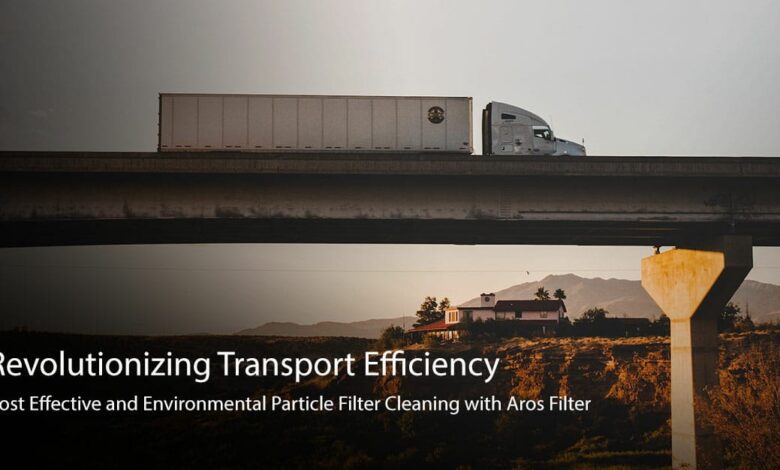Revolutionizing Transport Efficiency: Cost Effective and Environmental Particle Filter Cleaning with Aros Filter

Transforming Vehicle Sustainability
In the pursuit of cleaner and greener transport, active regeneration systems have emerged as a game-changer within the industry. These sophisticated systems, utilizing electronics and control technology, facilitate the cleaning of particle filters by generating heat or initiating chemical processes. Active regeneration can occur automatically or on-demand, enhancing filter performance and mitigating the risk of blockages.
The Crucial Role of Particle Filters in Transport Vehicles
Particle filters stand as vital guardians in the exhaust systems of transport vehicles, combating harmful emissions and preserving the environment. These filters diligently capture and eliminate harmful particles, such as soot and smoke, which pose significant health risks and contribute to air pollution. By incorporating particle filters into vehicle exhaust systems, emissions of these hazardous particles can be significantly reduced, leading to a cleaner and healthier environment for all.
Influential Sectors: The Impact of Cleaned and Uncleaned Particle Filters
The impact of cleaned or neglected particle filters extends across various sectors within the transport industry. Let us explore some prominent examples:
- Goods Transportation: Long-haul transportation of goods heavily relies on well-maintained particle filters to comply with stringent emission standards and minimize harmful particle emissions. By adopting active regeneration systems, transport companies can safeguard both the environment and public health, ensuring a sustainable future for all.
- Public Transport: Buses, trams, and other public transport vehicles serve as lifelines in urban mobility. By implementing effective particle filter cleaning, air quality can be significantly improved, reducing the adverse health effects of air pollution on commuters and city dwellers. Cleaned particle filters contribute to a more pleasant and healthy transportation experience.
- Construction and Industrial Machinery: Construction sites and industrial areas witness the operation of heavy machinery emitting substantial amounts of particles. Uncleaned particle filters in these environments contribute to heightened air pollution levels. By adopting active regeneration systems, the emission of harmful particles can be curbed, ensuring the well-being of workers and nearby communities.
Advantages of Active Regeneration Systems
- Enhanced Filter Performance: Active regeneration systems enable particle filters to maintain optimal performance levels, minimizing the risk of efficiency degradation and blockages. This translates into better fuel economy and reduced maintenance costs.
- Cost-Effectiveness: By employing active regeneration systems, the lifespan of particle filters can be significantly extended. This, in turn, minimizes the need for frequent and expensive replacements, resulting in substantial cost savings for vehicle owners.
- Environmental Friendliness: The effective removal of particles from filters significantly reduces emissions, leading to improved air quality and a healthier environment. Active regeneration systems contribute to a sustainable transport sector by reducing the carbon footprint and promoting cleaner technologies.
Challenges in Implementing Active Regeneration Systems
- Energy Consumption and Resource Requirements: Active regeneration systems require additional electronics and control mechanisms, which can increase energy consumption in vehicles. Furthermore, heat generation or chemical processes may require additional resources, impacting sustainability efforts. Striking a balance between effective particle filter cleaning and energy efficiency remains an ongoing challenge.
- Installation and Maintenance Expertise: The proper installation and ongoing maintenance of active regeneration systems are critical to ensure their effectiveness and reliability. Skilled professionals with technical expertise are required to handle these complex systems, warranting careful consideration and selection of service providers.
Weighing the Options: Making an Informed Decision
When considering particle filter cleaning for transport vehicles, it is crucial to evaluate the advantages and disadvantages of different approaches, including the adoption of active regeneration systems. Factors such as initial costs, long-term savings, environmental impact, and expertise requirements must be carefully assessed. By examining these perspectives, individuals and businesses can make informed decisions aligned with their objectives and goals.
Why Clean Particle Filters Instead of Buying New Ones?
In the quest for maintaining the optimal performance of particle filters in transport vehicles, the question often arises: should one opt for cleaning the filters or simply replace them with new ones? While the decision ultimately depends on various factors, there are compelling reasons why cleaning particle filters can be a preferable choice over purchasing new ones.
- Cost Considerations: Cleaning particle filters can offer significant cost savings compared to buying new ones. Particle filters, especially those designed for heavy-duty vehicles, can be expensive. By investing in professional cleaning services, individuals and businesses can extend the lifespan of their existing filters, reducing the need for frequent replacements and the associated costs.
- Environmental Impact: Manufacturing new particle filters requires raw materials and energy, contributing to the carbon footprint and environmental strain. By choosing to clean and reuse filters, we conserve resources and minimize waste generation. This approach aligns with the principles of sustainability and supports the circular economy by maximizing the utility of existing filter assets.
- Retaining Performance and Compatibility: Over time, particle filters become conditioned to the specific engine and vehicle they are installed in. By cleaning and reusing filters, the engine and filter can maintain their compatibility, ensuring optimal performance. New filters may require adaptation and calibration to achieve the same level of efficiency, potentially leading to additional costs and adjustments.
- Expertise and Quality Assurance: Professional filter cleaning services, such as those offered by companies like Aros Filter, employ skilled technicians who possess the expertise and experience to thoroughly clean and restore filters to their original functionality. These services often come with quality assurance, providing peace of mind that the filters will perform effectively after cleaning.
- Time Efficiency: Replacing particle filters with new ones typically involves sourcing the correct filters, arranging for their installation, and potentially experiencing downtime during the replacement process. Cleaning the filters, on the other hand, can be a more time-efficient option, allowing vehicles to quickly resume operations without extended interruptions.
It is worth noting that while cleaning particle filters offers numerous benefits, there may be instances where replacement becomes necessary. Filters that are severely damaged, compromised, or have reached the end of their usable life may require replacement for optimal performance and compliance with emissions regulations. Consulting with experts and conducting regular inspections can help determine the appropriate course of action for each individual case.
In conclusion, the decision to clean particle filters instead of purchasing new ones can be a practical and environmentally conscious choice. It presents cost savings, minimizes resource consumption, preserves compatibility and performance, and benefits from the expertise of professional cleaning services. By embracing this approach, individuals and businesses can actively contribute to a sustainable transport sector while maintaining the efficiency and longevity of their particle filters.
Revolutionizing the Filter Industry: Aros Filter’s Cutting-Edge Cleaning Techniques
Located in Vasteras, Sweden, Aros Filter AB, a well-established company with over 25 years of experience in filter development and innovation, is transforming the filter industry with its groundbreaking cleaning methods. Specializing in the sale, refurbishment, and manufacturing of eco-friendly filters for various sectors, including automotive, transportation, industrial, and ventilation, Aros Filter AB is revolutionizing the way particle filters are maintained.
Deciding on the most effective method to maintain particle filters can be perplexing for many. Recognizing this challenge, Aros Filter AB offers a cost-effective solution for cleaning particle filters and catalysts. Their state-of-the-art facility in Vasteras is equipped with cutting-edge technology, enabling a process known as catalytic combustion or chemical cleaning of soot particles. This innovative approach ensures that filters installed in diesel engines can be either replaced or efficiently cleaned after a specific number of operating hours, as their effectiveness diminishes over time.
By embracing these advanced techniques, motorists can easily safeguard themselves against the harmful exhaust emissions that pose a threat to their cardiovascular and respiratory systems. Today’s particle filters primarily combat PM2.5 and PM10, effectively purifying exhaust gases and preventing the release of hazardous particles into the air. As a result, our cities, nature, and vehicles benefit from cleaner air, leading to healthier living environments for all.
“We are proud to offer our customers a sustainable solution that not only extends the lifespan of their filters but also contributes to improving air quality,” said Anders Holmberg, CEO of Aros Filter AB. “Through our advanced cleaning techniques, we are making significant strides towards creating a greener and healthier future.”
Aros Filter AB’s commitment to innovation and environmental stewardship has solidified its position as a leader in the filter industry. With their cutting-edge techniques and dedication to customer satisfaction, the company continues to set new standards for the maintenance and development of eco-friendly filters.
A Sustainable Future Driven by Active Regeneration
Active regeneration systems have revolutionized particle filter cleaning within the transport sector, showcasing their potential to improve filter performance and reduce the risk of blockages. While challenges exist, the benefits in terms of enhanced filter efficiency, cost-effectiveness, and environmental impact are undeniable. By raising awareness about particle filter cleaning, companies like Aros Filter serve as exemplary proponents of cost-effective and eco-friendly services, actively contributing to a sustainable reduction in emissions within the transport sector.
References:
- Transportstyrelsen (2023). “Avgaser från fordon.” Retrieved from: https://transportstyrelsen.se/vagtrafik/Miljo/avgaser/
- European Commission (2023). “Vehicle Emission Standards.” Retrieved from: https://ec.europa.eu/clima/policies/transport/vehicles/standards_en
- Aros Filter AB (2023). Retrieved from https://arosfilter.se/






